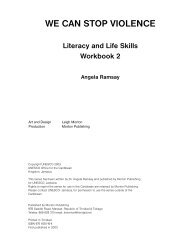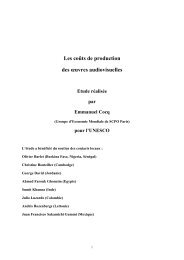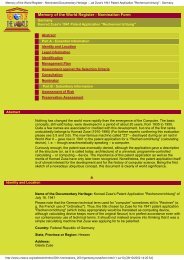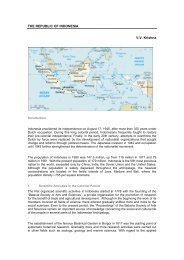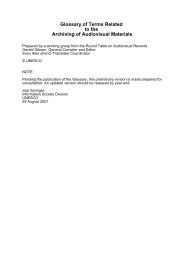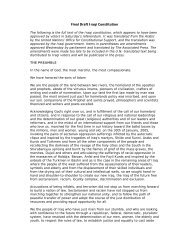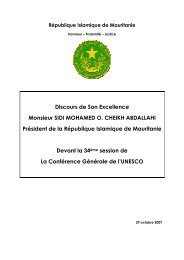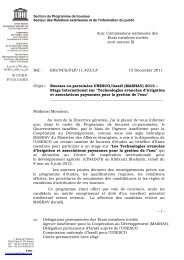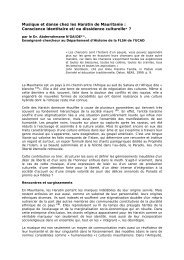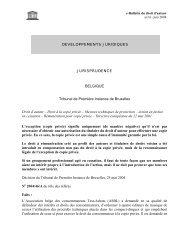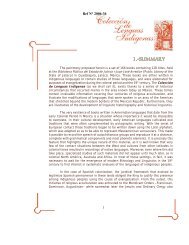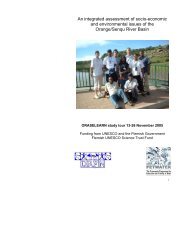Accepted Papers - 3.pdf - UNESCO
Accepted Papers - 3.pdf - UNESCO
Accepted Papers - 3.pdf - UNESCO
Create successful ePaper yourself
Turn your PDF publications into a flip-book with our unique Google optimized e-Paper software.
3. Socio-economic upliftment of farmers-<br />
Livelihood issues.<br />
2.0 Location and Watershed information<br />
Watershed Dedag, is situated on Rajgarh -<br />
Haripurdhar state highway, 10 km from Rajgarh<br />
town in H.P. The watershed is situated at 77 0 24’E<br />
and latitude 30 0 50’N with height varying from 1600-<br />
2348 meters above mean sea level. It has total<br />
effective area 570 ha.The watershed consists 180<br />
ha of total culturable area and only 116 ha is being<br />
cultivated presently. The irrigation facility at<br />
watershed is only restricted to 43 ha whereas rest<br />
of the area is un irrigated .The main source of<br />
irrigation is rainfall and natural springs. There are<br />
145 families (SC-67, Gen- 78) which has been<br />
covered under project from five villages namely<br />
Dedag, Sanio, Matari , Jelag,and Khanoteo. The<br />
total beneficiaries are 753 out of which 392 are male<br />
and 361 female. Most of the family member (719)<br />
are literate and majority families ( 90%) earn their<br />
livelihood from agriculture.<br />
3.0 Concept<br />
There is growing realization that technology<br />
generation, dissemination and adoption cannot be<br />
taken in isolation. So National watershed<br />
development project for rainfed areas, Dedag, has<br />
been conceptualized differently from other Extension<br />
and Developmental programmes to solve farmer’s<br />
problem in participatory mode and through<br />
community action. Participatory endeavour of<br />
watershed project is to bring about the socio<br />
economic transformations by way of diversifying hill<br />
farming for complete sustainability. So, a systematic<br />
approach is followed to achieve the objective.<br />
Participatory approach is an important initiative to<br />
decentralize decision making process and promote<br />
ownerness among the farming communities. These<br />
paradigms of development are required for<br />
sustainable improvement of socio economic condition<br />
of resource poor stakeholders.(Mishra,2001) In this<br />
process, the real issues are analyzed by sharing<br />
experiences and knowledge of local communities and<br />
external service providers. This empowers the<br />
people in decision making by sharing responsibilities<br />
and accountabilities of activities to be carried out.<br />
The bio-physical and socio-economic constraints,<br />
priorities and preferences of interventions were<br />
438<br />
identified before launching the program through<br />
agro-ecological system analysis. The professionals<br />
and stakeholders work jointly for problem solving<br />
and decision making processes. The service provider<br />
acts as facilitators and the stakeholders as actors<br />
while preparing the project in participatory mode.<br />
Technologies generated at institute were assessed<br />
and refined through adaptive research and<br />
disseminated to farmer’s field by conducting<br />
demonstrations in a participatory mode.<br />
4.0 Methodology<br />
The national watershed development project<br />
for rainfed areas is basically a Participatory<br />
programme based on a community managed system<br />
called- “Jalagam Sangh” and all the development<br />
work has to be executed by the farmers under the<br />
guidance of experts. Therefore to achieve this<br />
objective a team of experts from Hill Agriculture<br />
Research and Extension Centre (HAREC)<br />
Dhaulakuan.(H.P Agricultural University , Palampur)<br />
worked with the farmers on following lines.<br />
4.1 Social Aspects<br />
Community Organization<br />
Capacity Building<br />
Planning. Execution of programme.<br />
4.2 Developmental and technical Aspects<br />
Technical programme (Survey, Design etc.)<br />
Farm Production system interventions.<br />
4.1 Social Aspects<br />
Important socio-psychological components<br />
(confidence building ,motivation, aspiration, conflict<br />
resolution, learning and transparency) ,which play<br />
crucial role in accomplishing sustainability were



